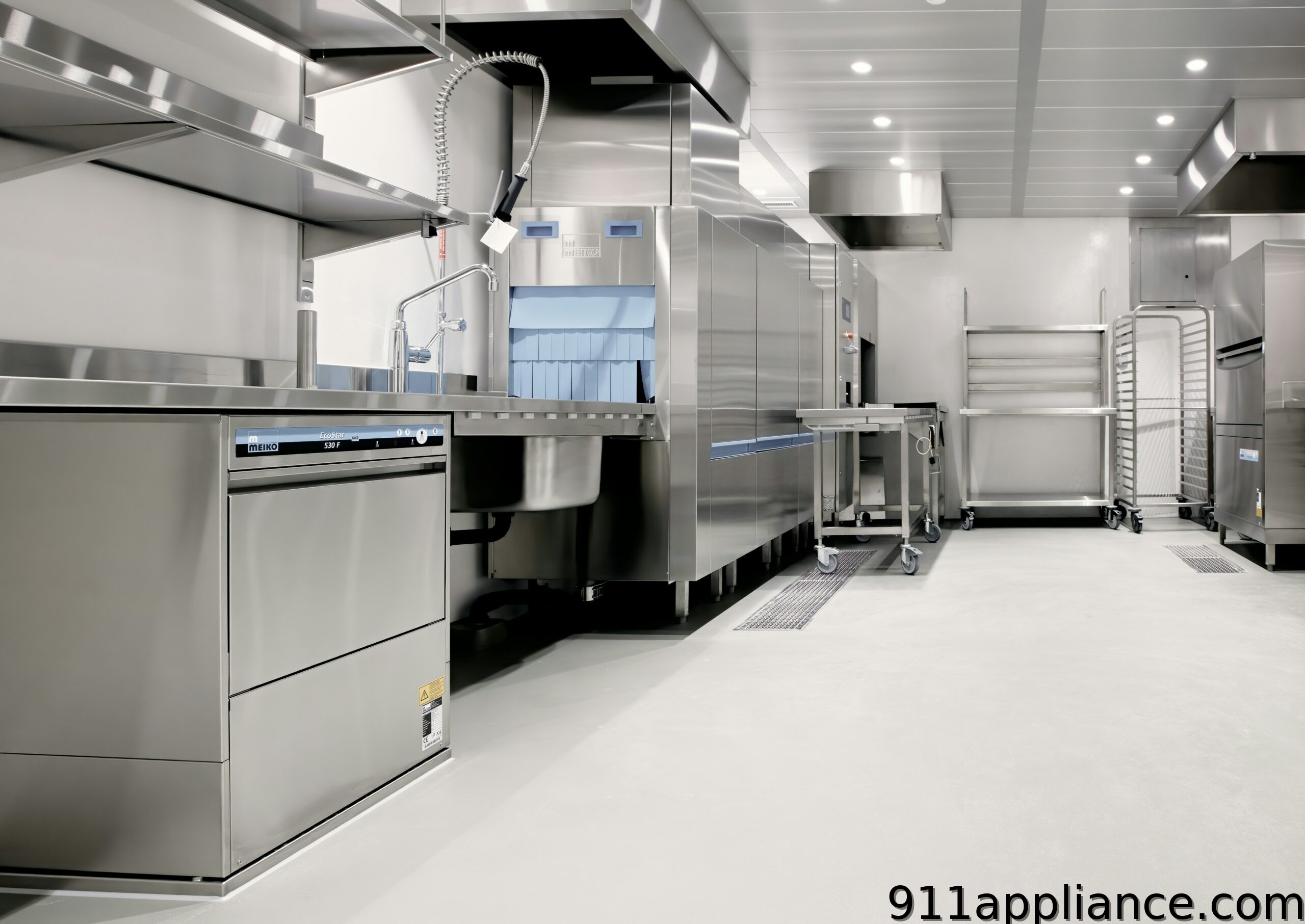In today’s fast-paced world, a dishwasher has become an essential appliance in modern households. It not only saves time and effort but also ensures that dishes are cleaned thoroughly and hygienically. With the advancement in technology, dishwashers have evolved to become more efficient and user-friendly. However, like any other appliance, dishwashers can encounter problems that may hinder their performance. In this article, we will explore the basics of a dishwasher, common problems that can arise, signs that indicate your dishwasher is not functioning properly, the importance of regular maintenance, troubleshooting tips, DIY solutions, when to call a professional for repair, tips for preventing future issues, upgrading options, and sustainable solutions for dishwasher problems.
Table of Contents
- Key Takeaways
- Common dishwasher problems and their causes
- Signs that your dishwasher is not functioning properly
- Importance of regular dishwasher maintenance
- How to troubleshoot dishwasher issues
- DIY solutions for common dishwasher problems
- When to call a professional for dishwasher repair
- Tips for preventing future dishwasher issues
- Upgrading your dishwasher for better performance
- Sustainable solutions for dishwasher problems
- How Can Preventive Maintenance Help with Dishwasher Issues?
- FAQs
- What are some common dishwasher issues?
- Why is my dishwasher not cleaning dishes properly?
- What should I do if my dishwasher is leaking?
- How can I prevent dishwasher issues?
- When should I call a professional for dishwasher repairs?
Key Takeaways
- A dishwasher is a machine that cleans dishes using hot water and detergent.
- Common dishwasher problems include clogged spray arms, dirty filters, and malfunctioning pumps.
- Signs of a malfunctioning dishwasher include dishes not coming out clean, strange noises, and leaks.
- Regular maintenance, such as cleaning the filters and checking for leaks, can prevent future problems.
- Troubleshooting tips include checking the spray arms, cleaning the filters, and ensuring proper loading of dishes.
Understanding the basics of a dishwasher
A dishwasher is a mechanical device that cleans dishes and utensils by spraying hot water and detergent onto them. It consists of several components such as a water inlet valve, pump, motor, heating element, spray arm, and drain. The process begins with the water inlet valve allowing water to enter the dishwasher. The pump then circulates the water through the spray arm, which sprays hot water and detergent onto the dishes. The dirty water is then drained out through the drain.
There are different types of dishwashers available in the market to suit various needs and preferences. Built-in dishwashers are the most common type and are designed to be installed under the kitchen counter. They offer a seamless look and are usually more powerful than other types. Portable dishwashers are freestanding units that can be moved around as needed. They are ideal for small kitchens or renters who cannot install a built-in dishwasher. Drawer dishwashers are compact units that can be installed at waist height for easy loading and unloading. They are perfect for people with limited mobility or those who prefer not to bend down.
Common dishwasher problems and their causes
Despite their efficiency, dishwashers can encounter problems that may affect their performance. Some common problems include clogging of the dishwasher drain, leaking of water from the dishwasher, failure of the dishwasher to clean dishes properly, and malfunctioning of the dishwasher’s spray arm.
Clogging of the dishwasher drain can occur due to food particles, grease, or debris getting stuck in the drain hose or filter. This can lead to water not draining properly, resulting in dirty dishes and a foul smell. Leaking of water from the dishwasher can be caused by a faulty door seal, loose connections, or a cracked hose. This can not only damage your kitchen floor but also indicate a problem with the dishwasher’s internal components. Failure of the dishwasher to clean dishes properly can be attributed to various factors such as a clogged spray arm, worn-out wash arm bearing ring, or a malfunctioning pump. Lastly, a malfunctioning spray arm can result in uneven cleaning and poor water distribution.
Signs that your dishwasher is not functioning properly
It is important to be aware of the signs that indicate your dishwasher is not functioning properly. Unusual noises coming from the dishwasher, such as grinding or banging sounds, can indicate a problem with the motor or pump. A foul smell emanating from the dishwasher even after a wash cycle can be a sign of clogged filters or drains. Dishes not coming out clean after a wash cycle can indicate issues with the spray arm, pump, or water inlet valve.
Importance of regular dishwasher maintenance
Regular maintenance is crucial to keep your dishwasher in good condition and ensure its optimal performance. It not only extends the lifespan of your appliance but also helps prevent costly repairs. Regular maintenance also helps maintain hygiene and cleanliness in your kitchen.
Some benefits of regular maintenance include improved cleaning performance, reduced energy consumption, prevention of clogs and leaks, and elimination of foul odors. By cleaning and maintaining your dishwasher regularly, you can ensure that it operates efficiently and effectively.
Simple maintenance tips to keep your dishwasher in good condition include cleaning the filter regularly, checking and cleaning the spray arm, inspecting and cleaning the door seal, running a vinegar cycle to remove mineral deposits, and wiping down the interior of the dishwasher.
How to troubleshoot dishwasher issues
If you encounter any problems with your dishwasher, it is important to troubleshoot the issues before calling for professional help. By following a step-by-step guide, you can identify and fix common dishwasher problems on your own.
The first step is to check for any visible signs of damage or blockage. Inspect the drain hose, filter, spray arm, and door seal for any debris or obstructions. Clean or replace any parts that are damaged or clogged. Next, check the water supply and ensure that the water inlet valve is functioning properly. If the dishwasher is not filling with water, it may be due to a faulty valve that needs to be replaced. Lastly, check the motor and pump for any signs of malfunction. If you notice any unusual noises or leaks, it may indicate a problem with these components.
DIY solutions for common dishwasher problems
There are several simple solutions that can be done at home without professional help. For clogging of the dishwasher drain, you can try using a plunger or a drain snake to remove any blockages. Cleaning the filter regularly can also prevent clogs from occurring. If your dishwasher is leaking water, check the door seal for any cracks or damage. Replace the seal if necessary. For issues with cleaning performance, ensure that the spray arm is not clogged and that there is enough water pressure. You can clean the spray arm by removing it and soaking it in warm soapy water.
When to call a professional for dishwasher repair
While some dishwasher problems can be fixed with DIY solutions, there are situations where professional help is necessary. If you are unsure about the cause of the problem or if you are unable to fix it on your own, it is best to call a professional for dishwasher repair.
Some situations where professional help is necessary include electrical issues, major leaks, motor or pump failure, and complex repairs. A professional technician will have the expertise and tools to diagnose and fix the problem efficiently. When choosing a dishwasher repair service, it is important to look for a reliable and experienced company. Read reviews, ask for recommendations, and ensure that the technicians are certified and insured.
Tips for preventing future dishwasher issues
Prevention is always better than cure when it comes to dishwasher problems. By following some best practices, you can maintain your dishwasher and prevent future issues from occurring.
Some tips for preventing future dishwasher issues include scraping off excess food before loading the dishes, using the right amount of detergent, avoiding overloading the dishwasher, running hot water before starting a wash cycle, and regularly cleaning and maintaining the dishwasher. It is also important to follow the manufacturer’s instructions and avoid using harsh chemicals or abrasive cleaners that can damage the dishwasher.
Upgrading your dishwasher for better performance
If you are experiencing frequent problems with your current dishwasher or if you are looking to upgrade for better performance, there are several factors to consider. The size of your kitchen and available space will determine whether you need a built-in, portable, or drawer dishwasher. The capacity of the dishwasher should also be considered based on your household’s needs. Energy efficiency is another important factor to consider as it can help reduce utility bills and minimize environmental impact. Look for dishwashers with high energy star ratings. Other features to consider include noise level, wash cycles, and additional functions such as delay start or sanitize mode.
Some of the best dishwasher models in the market include Bosch 800 Series SHPM88Z75N, KitchenAid KDTE334GPS, and Miele G7106SCUSS. These models offer excellent cleaning performance, energy efficiency, and durability.
Sustainable solutions for dishwasher problems
In addition to regular maintenance and repair, there are sustainable solutions for dishwasher problems that can help reduce environmental impact. Traditional dishwasher detergents often contain harmful chemicals that can pollute waterways and harm aquatic life. Eco-friendly alternatives such as natural detergents or homemade solutions can be used to clean dishes effectively without causing harm to the environment.
Tips for reducing water and energy consumption while using a dishwasher include running full loads, using the eco or energy-saving mode, and avoiding pre-rinsing dishes. By adopting these sustainable practices, you can minimize your carbon footprint and contribute to a greener future.
In conclusion, a dishwasher is an essential appliance in modern households that saves time and effort while ensuring hygienic and thorough cleaning of dishes. Understanding the basics of a dishwasher, common problems that can arise, signs of malfunctioning, the importance of regular maintenance, troubleshooting tips, DIY solutions, when to call a professional for repair, tips for preventing future issues, upgrading options, and sustainable solutions are crucial for maintaining the optimal performance of your dishwasher. By following these guidelines and adopting sustainable practices, you can enjoy the convenience of a dishwasher while minimizing environmental impact and maximizing its lifespan.
How Can Preventive Maintenance Help with Dishwasher Issues?
Preventive maintenance for dishwashers is essential for avoiding costly repairs. Regularly cleaning the filter, checking for leaks, and examining the spray arms can prevent potential issues. Additionally, using a dishwasher cleaner can help keep the appliance running smoothly. Investing in preventive maintenance can save you time and money in the long run.
FAQs
What are some common dishwasher issues?
Some common dishwasher issues include clogged spray arms, malfunctioning heating elements, broken door latches, and faulty drain pumps. Regular maintenance can help prevent these problems by ensuring that food debris doesn’t build up in the spray arms or filter. Moreover, understanding dishwasher components is essential for troubleshooting and effectively addressing any issues that arise. Identifying the source of a malfunction early can save both time and costly repairs in the long run. In addition to regular maintenance, it’s crucial to implement safety measures for dishwashers to protect both your home and your appliances. Ensuring that the appliance is properly grounded and checking for any leaks can prevent accidents and prolong its lifespan. Furthermore, educating users about the correct loading techniques can minimize strain on the dishwasher and maximize its efficiency.
Why is my dishwasher not cleaning dishes properly?
There could be several reasons why your dishwasher is not cleaning dishes properly, including clogged spray arms, a malfunctioning detergent dispenser, or a faulty water inlet valve.
What should I do if my dishwasher is leaking?
If your dishwasher is leaking, you should first turn off the power and water supply to the appliance. Then, check the door gasket for any signs of damage or wear and tear. If the gasket is in good condition, the issue may be with the water inlet valve or the drain pump. You can also inspect the hoses and connections to ensure there are no cracks or loose fittings causing the leak. If necessary, utilize dishwasher leak identification techniques to trace the source more accurately. If the problem persists after checking these areas, it might be time to call a professional for further diagnosis and repair.
How can I prevent dishwasher issues?
To prevent dishwasher issues, it is important to regularly clean and maintain the appliance. This includes cleaning the spray arms, checking the door gasket for wear and tear, and regularly running a cleaning cycle with a dishwasher cleaner.
When should I call a professional for dishwasher repairs?
If you are unable to diagnose or fix the issue with your dishwasher, it is recommended to call a professional for repairs. Additionally, if you notice any unusual noises or smells coming from the appliance, it is best to seek professional help.



